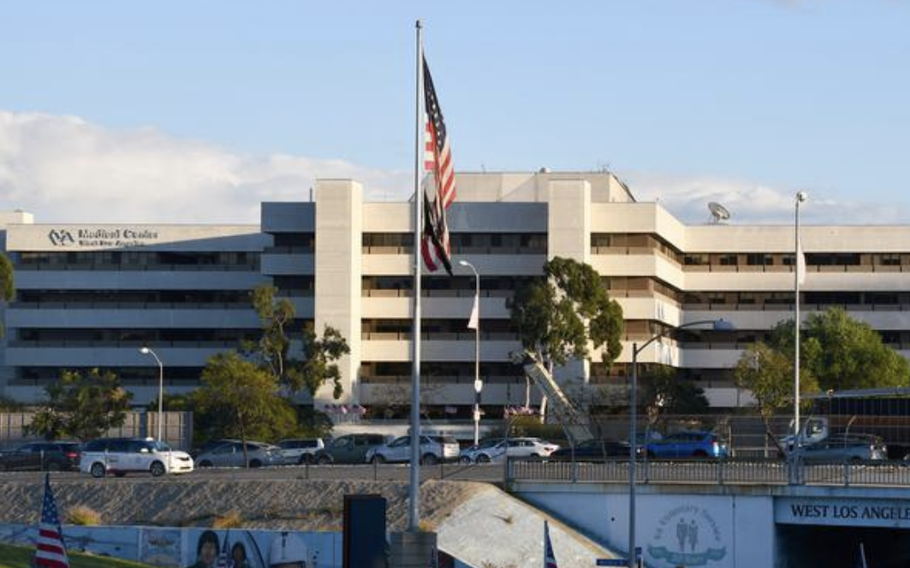
The Department of Veterans Affairs campus in West Los Angeles is shown in February 2022. A lawsuit filed on behalf of homeless veterans is seeking to force the VA to build 4,000 housing units on 388 acres. The land was bequeathed to the VA in the 1800s for the designated purpose of housing war veterans. The land is located in one of the more affluent areas of Los Angeles, and the VA has been leasing sites to commercial businesses. (Stars and Stripes)
WASHINGTON — A trial started Tuesday in federal court in Los Angeles in a class-action lawsuit that seeks to force the Department of Veterans Affairs to build 4,000 units of subsidized housing and 1,000 shelter beds for homeless veterans.
Attorneys representing homeless veterans in the case also seek to end the VA’s practice of leasing land to commercial enterprises — including a golf course, parking facilities and an oil drilling company — on the West Los Angeles campus where housing for the veterans is under development.
“For countless veterans, military service has rendered them unable to fully resume their civilian lives, sustain their family relationships, maintain employment, continue their education or even maintain a permanent residence,” according to the lawsuit, which is being heard in U.S. District Court in the Central District of California.
The attorneys are asking Judge David Carter to increase the number of “permanent supportive housing” units that the VA is required to build for homeless disabled veterans on the campus from 1,215 to 4,000.
Supportive housing would have case managers and social services on site to help disabled veterans live independently.
The attorneys also claim the VA has not followed through on the terms of a 2016 court settlement that established a master plan for building housing for disabled veterans on the site. They are demanding the VA increase the pace of housing construction, noting the first 200 units were completed only after the lawsuit was filed two years ago, according to a brief filed in July.
Lawyers from the Justice Department and VA are arguing the request to build thousands of additional units than originally planned places an undue burden on the VA. Lawyers said there has been no analysis conducted to determine whether all 4,000 units would be filled.
Attorneys for the homeless veterans also asked the judge to bar commercial home builders from disqualifying veterans for the subsidized housing because of their disability compensation.
Carter already ruled in May that the VA discriminated against homeless veterans by deeming them ineligible for the housing because of their level of disability benefits. Veterans with the most severe disability receive higher benefits.
A veteran with no dependents who has a 100% disability rating receives $40,000 in compensation annually, which is above the $25,050 limit for a one-person household, according to the lawsuit.
“I think it’s fair to say that we are limiting some veterans who by their service would most benefit from being in these units” because of their disability benefits, Steve Braverman, director of the West Los Angeles VA Medical Center testified, according to court documents.
The attorneys also are requesting the judge invalidate leases that the VA holds with commercial businesses now operating on the campus, which is in one of the more expensive sections of the city.
The lawsuit, which was filed in November 2022, described Los Angeles County as the homeless veterans capital of the nation.
Carter wrote in the spring that the VA has a fiduciary duty to provide housing and health care for homeless veterans on the 388-acre campus, which was donated to the VA in the 1800s after the Civil War for the designated purpose of housing veterans.
The lawsuit was certified as a class-action case in May 2022, comprised of homeless veterans in Los Angeles with serious mental illnesses or traumatic brain injuries.
About one-third of the nation’s homeless veterans live in California, based on a one-night yearly count conducted by the Department of Housing and Urban Development.
The number of homeless veterans in California is estimated to be more than 10,000. More than half are 55 years old and older. Los Angeles is at the epicenter of the problem.
Building permanent housing for disabled veterans on the campus will enable them to easily access the health care they require, according to the lawsuit.
The West Los Angeles VA Medical Center is located on campus grounds, providing medical services for thousands of veterans residing in Southern California.
“Many types of veterans health care benefits are exclusively offered at the medical center. Veterans who live far away from this facility — especially those with severe mental disabilities because of their service — find it difficult to traverse across Southern California to reach the center,” according to the lawsuit.
The lawsuit argues disabled veterans are being denied “meaningful access” to the health care that they need because the VA has failed to plan for an adequate number of units.